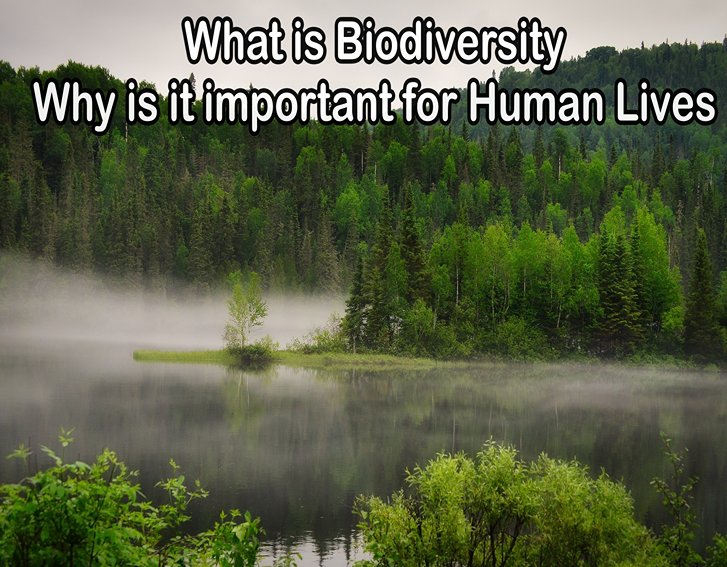Table of Contents
What is Biodiversity Why is it important for Human Lives
Biodiversity refers to the variety of living organisms that exist on Earth, including plants, animals, and microorganisms. It encompasses the diversity of genes, species, and ecosystems, and is a crucial component of our planet’s health and well-being. Biodiversity is important for human lives in many ways, from providing essential ecosystem services to supporting human livelihoods and economic development. What is Biodiversity Why is it important for Human Lives
One of the primary reasons biodiversity is important for human lives is that it provides essential ecosystem services that support human well-being. For example, forests, wetlands, and other ecosystems play a critical role in regulating climate, purifying water, and mitigating natural disasters such as floods and landslides. Biodiversity also plays a vital role in supporting agriculture and food security, providing pollination services, pest control, and genetic diversity for crop improvement.
Biodiversity also supports human health by providing natural medicines and contributing to the development of new drugs. Many of the world’s most effective medicines are derived from plants and other organisms found in nature. For example, aspirin, a widely used pain reliever, is derived from the bark of willow trees.
In addition to providing essential services and supporting human health, biodiversity also contributes to economic development and job creation. Many industries, such as tourism, fisheries, and forestry, rely on healthy ecosystems and biodiversity for their livelihoods. The global biodiversity economy is estimated to be worth trillions of dollars annually and provides millions of jobs worldwide.
Despite the many benefits of biodiversity, it is under threat from a range of human activities, including habitat destruction, overfishing, pollution, and climate change. Loss of biodiversity can lead to ecosystem collapse, decreased resilience to natural disasters, and declines in human health and well-being.
To protect biodiversity and ensure its continued provision of essential services to human societies, it is critical that we take action to reduce our impact on the natural world. This can include measures such as protecting and restoring critical habitats, implementing sustainable agriculture and fisheries practices, reducing greenhouse gas emissions, and promoting the sustainable use of natural resources.
Biodiversity is essential for human lives and well-being. It provides vital ecosystem services, supports human health and economic development, and contributes to our cultural and spiritual heritage. As such, it is crucial that we take action to protect and conserve biodiversity for the benefit of current and future generations.
Why is human life important?
Human life is important for several reasons, both from an individual and societal perspective. At an individual level, each person’s life is unique and valuable, and every individual has the potential to contribute to society in meaningful ways. Human life is also important because it has the capacity for self-awareness, consciousness, and the ability to think, create, and innovate.
From a societal perspective, human life is important because humans are social creatures that form communities and rely on each other for survival and progress. The collective efforts of individuals contribute to the development of societies, cultures, and civilizations. Human life is also important because it allows for the continuation of the species and the preservation of genetic diversity, which is critical for the evolution and adaptation of the human race.
Human life is important because of its impact on the environment and other living organisms. Humans have the power to shape and transform the natural world, and with that power comes a responsibility to protect and conserve the planet’s ecosystems and biodiversity.
The value and importance of human life is a subjective concept that can vary based on individual beliefs, cultural and societal values, and historical and philosophical perspectives. However, the significance of human life is undeniable, and it is up to each person and society as a whole to recognize and appreciate its worth and potential.
Why is biodiversity important?
Biodiversity is crucial for the health and well-being of our planet, and it is important for a variety of reasons. Biodiversity refers to the variety of living organisms that exist on Earth, including plants, animals, and microorganisms. Here are some of the key reasons why biodiversity is important:
Ecosystem services: Biodiversity provides a range of essential ecosystem services, such as air and water purification, nutrient cycling, and soil formation. These services are critical for the survival of all living organisms, including humans.
Food security: Biodiversity plays a crucial role in providing food security by supporting agricultural systems, providing pollination services, and contributing to genetic diversity for crop improvement.
Medicine: Many of the world’s most effective medicines are derived from plants and other organisms found in nature. Biodiversity provides a vast range of natural products that have the potential to lead to the development of new drugs and treatments.
Economic benefits: Biodiversity supports a range of industries, such as tourism, fisheries, and forestry, that generate billions of dollars in revenue and provide millions of jobs worldwide.
Climate regulation: Biodiversity helps regulate the Earth’s climate by capturing and storing carbon, and by regulating the water cycle.
Cultural and aesthetic value: Biodiversity is an important part of our cultural and spiritual heritage, and it has aesthetic value as well. People derive pleasure and inspiration from the beauty of nature and the diversity of life on Earth.
Despite the many benefits of biodiversity, it is under threat from a range of human activities, including habitat destruction, overfishing, pollution, and climate change. Loss of biodiversity can lead to ecosystem collapse, decreased resilience to natural disasters, and declines in human health and well-being. It is critical that we take action to protect and conserve biodiversity for the benefit of current and future generations. This can include measures such as protecting and restoring critical habitats, implementing sustainable agriculture and fisheries practices, reducing greenhouse gas emissions, and promoting the sustainable use of natural resources.
Why biodiversity should be conserved?
Biodiversity is important to conserve for several reasons, including:
Ecological balance: Biodiversity plays a crucial role in maintaining ecological balance, which is essential for the health and sustainability of the planet’s ecosystems. A loss of biodiversity can lead to imbalances in food chains, nutrient cycling, and ecosystem functioning, which can have negative impacts on human health and well-being.
Ecosystem services: Biodiversity provides a range of essential ecosystem services, such as air and water purification, pollination, and soil formation. These services are critical for the survival of all living organisms, including humans, and are estimated to be worth trillions of dollars annually.
Food security: Biodiversity plays a crucial role in providing food security by supporting agricultural systems, providing pollination services, and contributing to genetic diversity for crop improvement. A loss of biodiversity can lead to a decline in food production and quality, which can have significant impacts on human nutrition and health.
Medicine: Many of the world’s most effective medicines are derived from plants and other organisms found in nature. Biodiversity provides a vast range of natural products that have the potential to lead to the development of new drugs and treatments.
Economic benefits: Biodiversity supports a range of industries, such as tourism, fisheries, and forestry, that generate billions of dollars in revenue and provide millions of jobs worldwide. A loss of biodiversity can lead to significant economic impacts, particularly for communities that rely on natural resources for their livelihoods.
Climate regulation: Biodiversity helps regulate the Earth’s climate by capturing and storing carbon, and by regulating the water cycle. A loss of biodiversity can lead to increased greenhouse gas emissions and changes in the Earth’s climate.
Cultural and aesthetic value: Biodiversity is an important part of our cultural and spiritual heritage, and it has aesthetic value as well. People derive pleasure and inspiration from the beauty of nature and the diversity of life on Earth.
The conservation of biodiversity is important to maintain the health and well-being of the planet’s ecosystems, as well as to support human health and economic prosperity. It is critical that we take action to protect and conserve biodiversity for the benefit of current and future generations. This can include measures such as protecting and restoring critical habitats, implementing sustainable agriculture and fisheries practices, reducing greenhouse gas emissions, and promoting the sustainable use of natural resources. What is Biodiversity Why is it important for Human Lives













